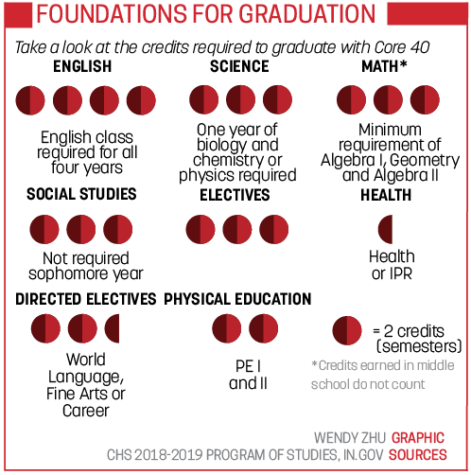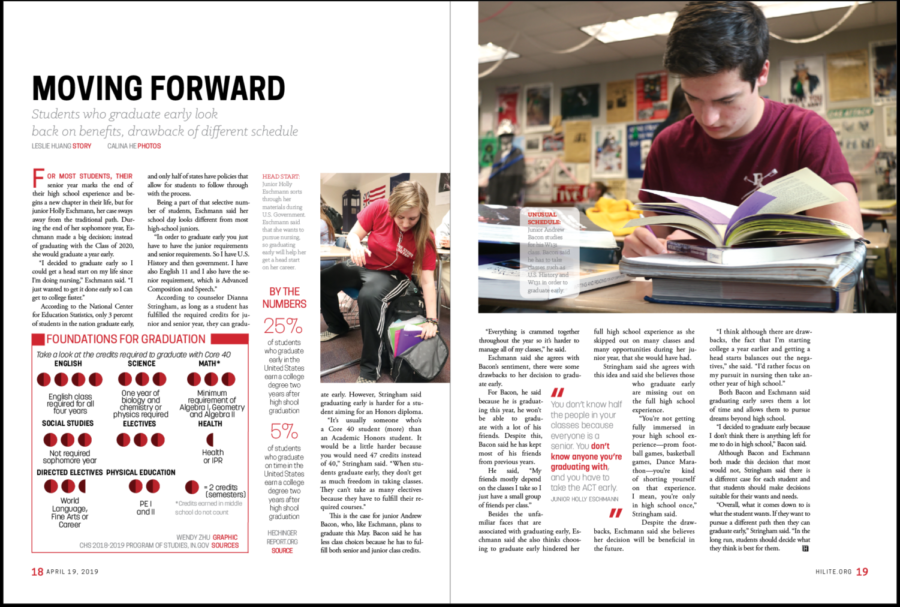For most students, their senior year marks the end of their high school experience and begins a new chapter in their life, but for junior Holly Eschmann, her case sways away from the traditional path. During the end of her sophomore year, Eschmann made a big decision; instead of graduating with the Class of 2020, she would graduate a year early.

UNUSUAL SCHEDULE:
Junior Andrew Bacon studies for his W131 class. Bacon said he has to take classes such as U.S. History and W131 in order to graduate early.
“I decided to graduate early so I could get a head start on my life since I’m doing nursing,” Eschmann said. “I just wanted to get it done early so I can get to college faster.”
According to the National Center for Education Statistics, only 3 percent of students in the nation graduate early, and only half of states have policies that allow for students to follow through with the process.
Being a part of that selective number of students, Eschmann said her school day looks different from most high-school juniors.
“In order to graduate early you just have to have the junior requirements and senior requirements. So I have U.S. History and then government. I have also English 11 and I also have the senior requirement, which is Advanced Composition and Speech.”
According to counselor Dianna Stringham, as long as a student has fulfilled the required credits for junior and senior year, they can graduate early. However, Stringham said graduating early is harder for a student aiming for an Honors diploma.
“It’s usually someone who’s a Core 40 student (more) than an Academic Honors student. It would be a little harder because you would need 47 credits instead of 40,” Stringham said. “When students graduate early, they don’t get as much freedom in taking classes. They can’t take as many electives because they have to fulfill their required courses.”
This is the case for junior Andrew Bacon, who, like Eschmann, plans to graduate this May. Bacon said he has less class choices because he has to fulfill both senior and junior class credits.
“Everything is crammed together throughout the year so it’s harder to manage all of my classes,” he said.
Eschmann said she agrees with Bacon’s sentiment, there were some drawbacks to her decision to graduate early.

For Bacon, he said because he is graduating this year, he won’t be able to graduate with a lot of his friends. Despite this, Bacon said he has kept most of his friends from previous years.
He said, “My friends mostly depend on the classes I take so I just have a small group of friends per class.”
Besides the unfamiliar faces that are associated with graduating early, Eschmann said she also thinks choosing to graduate early hindered her full high school experience as she skipped out on many classes and many opportunities during her junior year, that she would have had.
Stringham said she agrees with this idea and said she believes those who graduate early are missing out on the full high school experience.
“You’re not getting fully immersed in your high school experience—prom football games, basketball games, Dance Marathon—you’re kind of shorting yourself on that experience. I mean, you’re only in high school once,” Stringham said.
Despite the drawbacks, Eschmann said she believes her decision will be beneficial in the future.
“I think although there are drawbacks, the fact that I’m starting college a year earlier and getting a head starts balances out the negatives,” she said. “I’d rather focus on my pursuit in nursing then take another year of high school.”
Both Bacon and Eschmann said graduating early saves them a lot of time and allows them to pursue dreams beyond high school.
“I decided to graduate early because I don’t think there is anything left for me to do in high school,” Bacon said.
Although Bacon and Eschmann both made this decision that most would not, Stringham said there is a different case for each student and that students should make decisions suitable for their wants and needs.
“Overall, what it comes down to is what the student wants. If they want to pursue a different path then they can graduate early,” Stringham said. “In the long run, students should decide what they think is best for them.































![What happened to theater etiquette? [opinion]](https://hilite.org/wp-content/uploads/2025/04/Entertainment-Perspective-Cover-1200x471.jpg)














































![Review: “The Immortal Soul Salvage Yard:” A criminally underrated poetry collection [MUSE]](https://hilite.org/wp-content/uploads/2025/03/71cju6TvqmL._AC_UF10001000_QL80_.jpg)
![Review: "Dog Man" is Unapologetically Chaotic [MUSE]](https://hilite.org/wp-content/uploads/2025/03/dogman-1200x700.jpg)
![Review: "Ne Zha 2": The WeChat family reunion I didn’t know I needed [MUSE]](https://hilite.org/wp-content/uploads/2025/03/unnamed-4.png)
![Review in Print: Maripaz Villar brings a delightfully unique style to the world of WEBTOON [MUSE]](https://hilite.org/wp-content/uploads/2023/12/maripazcover-1200x960.jpg)
![Review: “The Sword of Kaigen” is a masterpiece [MUSE]](https://hilite.org/wp-content/uploads/2023/11/Screenshot-2023-11-26-201051.png)
![Review: Gateron Oil Kings, great linear switches, okay price [MUSE]](https://hilite.org/wp-content/uploads/2023/11/Screenshot-2023-11-26-200553.png)
![Review: “A Haunting in Venice” is a significant improvement from other Agatha Christie adaptations [MUSE]](https://hilite.org/wp-content/uploads/2023/11/e7ee2938a6d422669771bce6d8088521.jpg)
![Review: A Thanksgiving story from elementary school, still just as interesting [MUSE]](https://hilite.org/wp-content/uploads/2023/11/Screenshot-2023-11-26-195514-987x1200.png)
![Review: "When I Fly Towards You", cute, uplifting youth drama [MUSE]](https://hilite.org/wp-content/uploads/2023/09/When-I-Fly-Towards-You-Chinese-drama.png)
![Postcards from Muse: Hawaii Travel Diary [MUSE]](https://hilite.org/wp-content/uploads/2023/09/My-project-1-1200x1200.jpg)
![Review: "Ladybug & Cat Noir: The Movie," departure from original show [MUSE]](https://hilite.org/wp-content/uploads/2023/09/Ladybug__Cat_Noir_-_The_Movie_poster.jpg)
![Review in Print: "Hidden Love" is the cute, uplifting drama everyone needs [MUSE]](https://hilite.org/wp-content/uploads/2023/09/hiddenlovecover-e1693597208225-1030x1200.png)
![Review in Print: "Heartstopper" is the heartwarming queer romance we all need [MUSE]](https://hilite.org/wp-content/uploads/2023/08/museheartstoppercover-1200x654.png)



